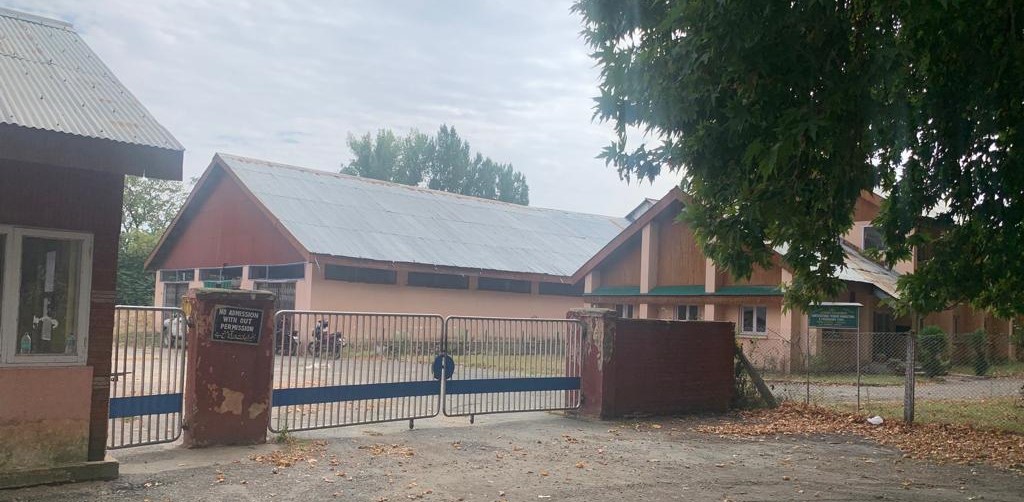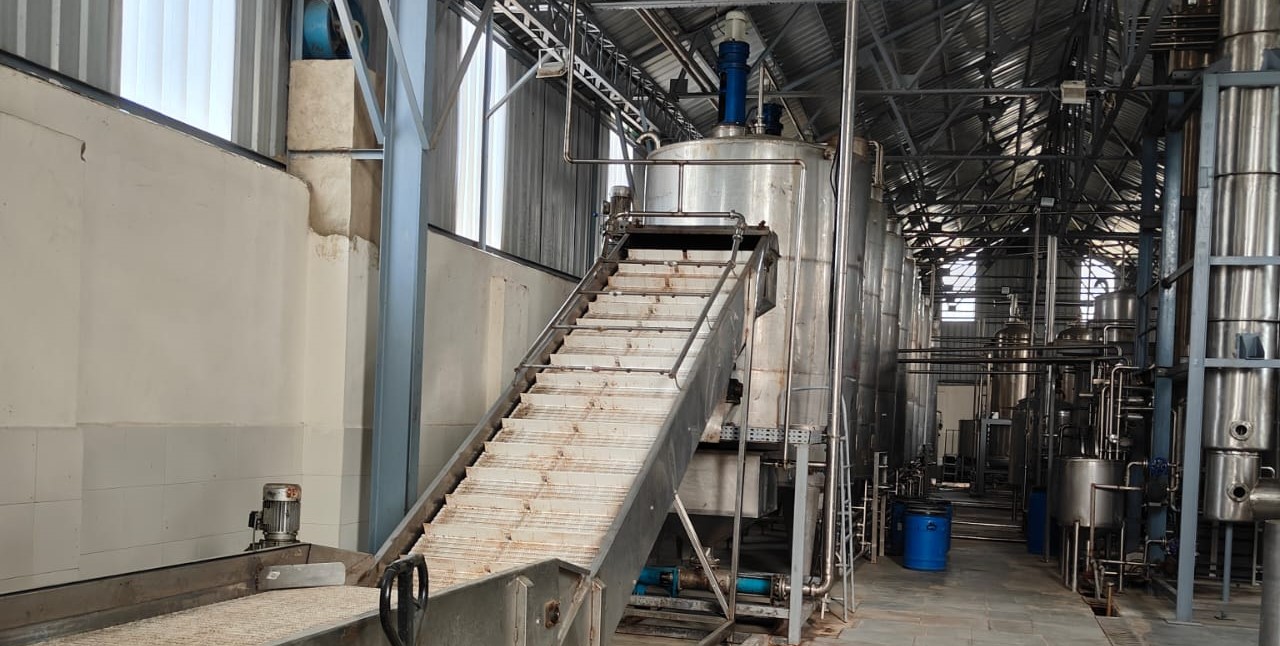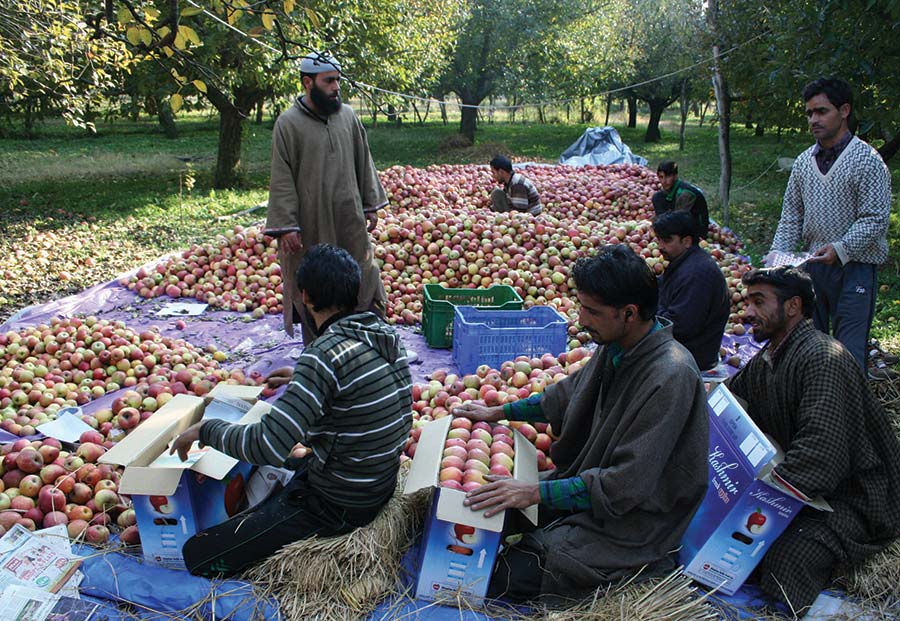Kashmir is India’s main apple cart but it is yet to adopt the best market practices that are in vogue in neighbouring Himachal Pradesh. Masood Hussain offers the text and context for the reintroduction of the Market Intervention Scheme (MIS) that could help growers sell the best of the produce and push Jammu and Kashmir towards emerging as India’s apple concentrate capital and a huge juice-making hub
Have you ever thought why the rates of Himachal apples are steady and predictable unlike that of Kashmir? As a clever society, Shimla has adopted a standard practice that no bad apple should impact its apple basket’s supply chain.
“Now for the third decade, government intervention prevents any C-grade apple from getting into the main market,” a key player in Kashmir’s apple economy said. “The government procures the C-category apple under the Market Intervention Scheme (MIS) at around Rs 10 (now) and gives it to its own apple crushing plant that converts it into the apple concentrate.”
This practice, the businessman said, has ensured that there is no bad apple in the Shimla supply. “In case, they do not find enough requirements for the C-grade, they throw it into the river but never send it to the market,” he said. “This is helping the producer society ensure the quality of the supply and prevent bad apples from rotting the basket. Usually, it fetches almost 10 per cent better rates.”
JKHPMC Story
Interestingly, Kashmir’s C-category apple is estimated to be more than 400 thousand tons, almost equal to the entire produce of Himachal Pradesh.

The Jammu and Kashmir Horticulture Produce Marketing Corporation (JKHPMC) was floated in 1978 with almost the same objective of piloting market interventions for generating new businesses and helping growers adopt the best practices. A year after, it roped in major FMCG, Cadbury to set up an apple crushing unit in Doabgah, deep in Kashmir’s erstwhile apple belt of Sopore. For various operational reasons, the JKHPMC was eventually asked to take over the unit in 1984.
For a few years, it used to procure the C-category fruit and the fallen fruit on its own and crush it into apple concentrate which has a huge market in India’s vast food processing sector. It was a key concentrate supplier to various giants for many years even though it never worked at full capacity.
MIS Take Off
The major intervention, however, came in 2003 when the PDP-Congress alliance introduced the MIS. This was aimed at using the bad apple to push an alternative sub-sector so that the apple cart offloads the historic taint. Envisaging procuring almost 7000 metric tonnes of C-grade apple at Rs 3 per kilogram from growers and offering it to apple crushing units at fifty paisa per kgs, the idea was to help the allied sector to grow.
Initially, rolled out to select areas and in 2004, it was expanded to other areas with better rates but the government could not achieve its 50,000 metric ton purchase. In fiscal 2004-05, a total of 9827.29 metric tonnes of C-grade apple was procured for Rs 2.51 crore. There were allegations of abuse of the scheme. An official in north Kashmir was caught and tried for procuring a huge quantity of C-grade apples merely on paper. In Poonch, the same was the case with Sandypear procurements. However, the scheme survived till Ghulam Nabi Azad became the Chief Minister.
In September 2007, the alliance was in doldrums. When PDP minister Dilawar Mir insisted the per kilogram rate be increased from Rs 4.25 to Rs 5.25, the Congress minister, Mangat Ram Sharma and Peerzada Syeed reacted seeking the rate to be reduced to Rs 2. They said the scheme is intended to “give further undue benefit of Rs 6 crore to a single businessman”. They alleged that almost 90 per cent of the C-grade fruit was procured by one businessman, Syed Altaf Bukhari, who had joined PDP.
Soon, the scheme fell flat and was discontinued from fiscal 2008-09.
The scheme was revived in 2015 when the BJP-PDP government decided that it would fund the purchase of around 9000 metric tonnes of C-category apples. Piloted in four districts, it was extended to 10 districts in the next year and then rolled back.
Why Roll Back?
Why the historic initiative was rolled back after being introduced twice is a researcher’s job. However, the eco-system that existed at the time of the rollout of the scheme needs an explanation.
Srinagar-based FIL Industries Ltd is a vertically integrated agri-empire that has stakes in multiple sub-sectors of agriculture. A pioneer in bringing the Controlled Atmosphere Storage (CAS) technology to India (it roped in the man who innovated and gave the technology to the world) and establishing the first store in Kashmir, FIL invested in a huge juice concentrate plant – Kohinoor International Agro Products (KIAP) as early as 1998.
For establishing the Rs 45 crore juice concentrate plant, FIL roped in Austrian partner Project Food & Beverages (PFB), which initially held 13 per cent shares. After suffering losses initially because of the teething problems, when it finally took off, it emerged as the best concentrate maker. It started apple concentrate supply to the German and American food chains. “We lost around Rs 20 crore between 1999 and 2003, but everything started getting compensated by the overwhelming response from overseas and the domestic market, later”.
“You talk of the major companies in India that require the concentrate, you will find out that we supply them all,” a top executive of the company said. “There is a lot of appetite for the concentrate we make because we ensure quality delivery.”
The modern plant has an inbuilt capacity to crush 1.5 tons per hour and remains operational for a few months, post-harvest. “We have never been able to run this facility at even half the capacity,” the executive said.
When the MIS was rolled out, it coincided with a whisper campaign that the entire scheme was aimed at helping Altaf Bukhari. At the scheme’s historic entry, he was on the margins of politics and when the scheme was revived, he was a minister in the cabinet.
A Changed Situation
Now, in 2023, when Bukhari owns his own political party, Jammu and Kashmir Apni Party, the situation on the ground is completely altered.
“Our unit is in profit, we are the apple concentrate leaders in Jammu and Kashmir,” the FIL executive said. “We have so much demand that we do not have enough to produce. We make around Rs 50 crore a year on apple concentrate alone.” He said they are producing almost 6000 tons of concentrate a season.

The executive said that when the MIS was in operation, they would procure as much as possible because we had the capacity and requirements. “Now, when MIS is not around, we did not shut shop, we manage through our vast network procuring the supplies we require,” he said, admitting that “MIS would have made the apple crushing units more competition ready with Chinese, Iranian and European concentrate making countries.” If it is not revived, he said, “We are not closing, we run our plant at less than forty per cent capacity but we work and earn.”
In contrast, the only other plan that JKHPMC ran at Doabgah was closed.

From the days when it was a major supplier to Nestle and other giants, the Doabgah plant had exhibited early sickness – partly because of the situation, machines and human resources. At one time, it even faced serious working capital issues. Since 2013, it has ceased to work. Earlier, it used to work round the clock during the crushing season and manage 600 tons of concentrate. In 2017, the government made efforts and revived it to the extent that it produced nearly 70 tons after many years. As the situation in the market changed, it failed to get buyers. It had a huge inventory and no buyers and the product had a limited shelf life. It booked good losses.
With employees retiring, the last time the plant had only 18 people to take care of it. The plant required a good investment to make its filtration facility function properly. Interestingly for most of its operations, the plant had not been using electricity and instead, an expensive diesel generator was running it!
Plant Outsourced
Finally, the government decided to outsource the facility. By 2022 fall, the tender for outsourcing its operation, maintenance and commercialisation was out. A promising agriculture entrepreneur, Hakim Khalid got the plant for 5+5 years. “We are in the process of repairing and oiling the machinery and we hope that we start operations this season,” Khalid said.
Khalid is not new to the field. A 1984 master’s degree holder in Agriculture Marketing Management from the University of Mysore, he left his family’s biscuit manufacturing business to explore his passion in the Middle East and North America. Back home in 2015, he invested Rs 22 crore in creating North Side Processor (NSP), a juice concentrate plant in Sangrama. With a capacity of one-ton crushing capacity an hour, the imported plant was commissioned with a bit of delay in 2021.
“We worked for very limited days of one season and produced 100 metric ton concentrate,” Hakim said. “This year, we are looking at a target of 500 metric tonnes.”
New Realities
The situation is simple. Kashmir’s apple production is increasing and there is a lot of emphasis on quality. Growers have identified markets that consume low-grade, cheap apples but that is not a long-term solution. Kashmir’s C-grade apple must be around half a million tonnes in a good yield year.
On the processing side, Bukhari has ceased to be the sole player. Now there are three units with almost the same capacity. If the three units are encouraged to manage the C-grade apple with the help of a revived MIS – copying the Himachal scheme, Kashmir can manage the last bad apple in Kashmir. It will improve the concentrate production ten times reducing the market dependence on China. Stopping C-grade will improve the rates for A and B-class apples and growers can be happy.
The other aspect that is usually overlooked is a cluster of almost 20 units scattered across the industrial bases across Kashmir and an equal number in Jammu. These juice makers, if encouraged, can throw a serious challenge to the best juice makers across India. Within less than five years, almost one-fourth of the fresh apple juice market can be overtaken by these units.















